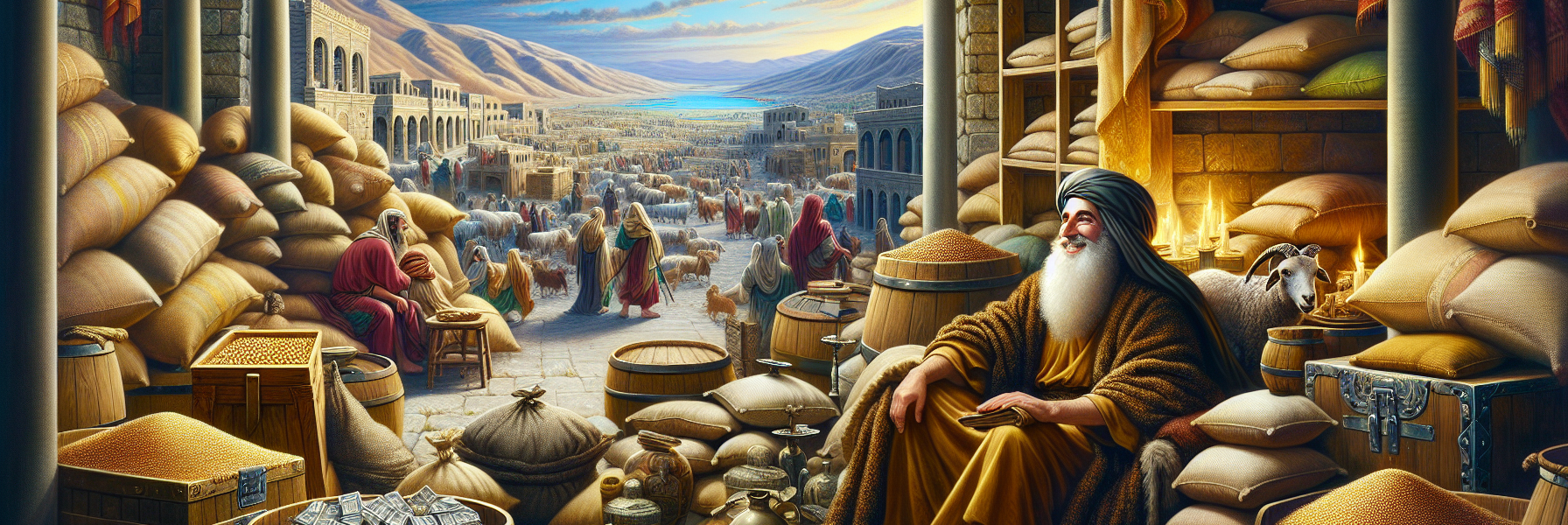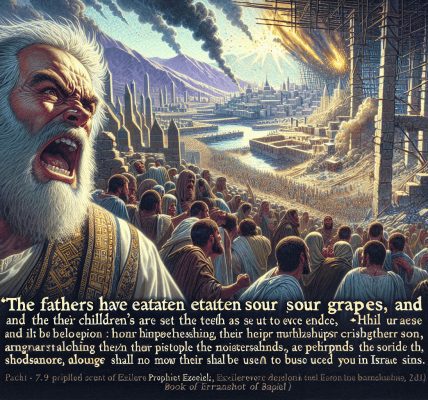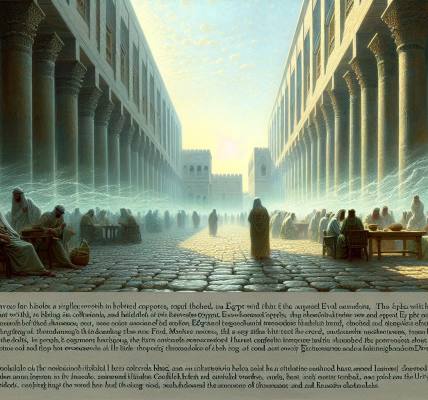**The Vanity of Earthly Wealth: A Tale of Nabal the Miser**
In the days when the kingdom of Israel was still young, there lived a wealthy merchant named Nabal in the city of Beth-Horon. He was a man of great possessions—his storehouses overflowed with grain, his flocks covered the hills, and his chests were filled with silver and gold. Yet, though God had granted him abundance, his heart was as dry as the desert wind, for he found no joy in his blessings.
Nabal had been born into privilege, the only son of a prosperous trader. From his youth, he had been taught to hoard his wealth, to measure his worth by the weight of his coins. As the years passed, he grew in riches but shriveled in spirit. He took a wife, but he did not love her. He fathered children, but he scarcely knew them. His feasts were lavish, yet his soul remained empty.
One evening, as Nabal sat in his courtyard counting his treasures, a traveler approached his gate—a poor scribe named Elihu, who had once been a scholar in Jerusalem before misfortune had stripped him of all he had. Thin and weary, Elihu bowed low and said, *”My lord, I beg but a crust of bread and a corner of your house to rest my head. The Lord will surely remember your kindness.”*
But Nabal’s eyes narrowed, and his lips curled in disdain. *”Why should I feed you?”* he scoffed. *”Did I plant the fields you toiled in? Did I cause the drought that ruined you? Go and find your bread elsewhere!”* And with a wave of his hand, he sent the man away into the night.
### **The Wasting of Wealth Without Joy**
As the seasons turned, Nabal’s wealth multiplied, yet his dissatisfaction deepened. He built finer houses, bought more land, and hosted grander feasts—but when he lay upon his bed at night, his heart was restless. *”What is the use of all this?”* he muttered to himself. *”I labor and gather, yet my soul is starved.”*
One day, word came that his eldest son had fallen gravely ill. Nabal sent for the finest physicians, paid for costly remedies, yet the boy grew weaker. In desperation, Nabal cried out to God, *”Spare him, and I will give half my wealth to the poor!”* But the child died, and Nabal’s grief was bitter. He tore his robes and wept, not only for his son, but for the years he had wasted in pursuit of gold while neglecting the boy’s love.
Soon after, a fire broke out in his storehouses, and though his servants rushed to save what they could, much of his grain was lost. Then came news that a band of raiders had attacked his herds in the south, scattering his flocks. Bit by bit, the riches he had clung to so tightly slipped through his fingers like sand.
### **The Grave Without Satisfaction**
In his old age, Nabal sat alone in his nearly empty house, his body frail, his wealth spent on futile remedies for ailments that would not heal. His wife had long since withdrawn from his bitterness, and his remaining children avoided him. When death finally came for him, there were few mourners at his burial.
The villagers whispered among themselves, *”What was the purpose of his toil? He amassed fortunes but never enjoyed them. He had children but left no legacy of love. He lived many years, yet his soul was never satisfied.”*
And so it was as the Preacher had written:
*”There is an evil that I have seen under the sun, and it lies heavy on mankind: a man to whom God gives wealth, possessions, and honor, so that he lacks nothing of all that he desires, yet God does not give him power to enjoy them, but a stranger enjoys them. This is vanity; it is a grievous evil. If a man fathers a hundred children and lives many years, so that the days of his years are many, but his soul is not satisfied with life’s good things, and he also has no burial, I say that a stillborn child is better off than he.”* (Ecclesiastes 6:1-3)
### **The Lesson of the Miser’s Life**
Years later, travelers passing through Beth-Horon would sometimes hear the tale of Nabal the Miser. The elders would shake their heads and say, *”A man may gain the whole world, yet lose his own soul. Better is a handful of contentment with the fear of the Lord than great treasure with turmoil.”*
And so the words of the wise endured: *”Enjoy what God has given you, for life is fleeting, and true riches are found not in gold, but in a heart at peace with Him.”*




